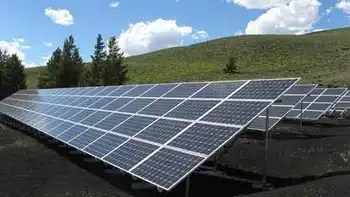TVA nuclear plants overheating river
By Maryville Daily Times
CSA Z463 Electrical Maintenance -
Our customized live online or in‑person group training can be delivered to your staff at your location.

- Live Online
- 6 hours Instructor-led
- Group Training Available
The Chattanooga Times Free Press reports the nation's largest public utility has already lost nearly $50 million in power generation at the Browns Ferry Nuclear Plant near Athens, Ala. Unless the summer cools down, TVA could lose more, pushing up fuel costs and consumer electric bills even after seven straight monthly increases.
TVA executives said the Browns Ferry Plant has operated at about half power for most of the past month and could remain slowed down through September.
TVA President Tom Kilgore said "all the radiant heat gets in the river when you have a summer as hot as this has been."
Among the nation's 66 nuclear plants, Browns Ferry has been the one hardest hit by concerns about overheated river water, according to the Nuclear Energy Institute and TVA. With three-reactors, it is TVA's biggest nuclear facility.
TVA has reduced power production at Browns Ferry at least 39 days since July 8 because of the high river temperature.
Just recently, TVA violated its permit with the Alabama Department of Environmental Management when the river temperature topped 90 degrees.
The cutback means TVA is losing 1,500 megawatts of power generation just when it's needed most. For each day of 50 percent power at Browns Ferry, the utility spends more than $1 million extra to pay for replacement power, utility executives said. The extra cost is added to ratepayer bills in the monthly fuel cost adjustment, which is up by more than 25 percent since March.
When the Tennessee River flows into the Guntersville Reservoir around Browns Ferry, the river widens and slows. The plant draws in river water to cool its equipment, then releases it back into the river. TVA uses mechanical draft cooling towers to help pull heat out of the cooling water before it is released.
Most U.S. nuclear plants are on an ocean or one of the Great Lakes or have closed-loop cooling systems that don't rely as much upon water from nearby rivers or lakes.
TVA's Watts Bar Nuclear Plant in Spring City has a closed-loop system. The Sequoyah plant near Soddy-Daisy uses less river water than Browns Ferry and has two cooling towers. TVA also plans a closed-loop system with twin cooling towers at the Bellefonte plant planned in Hollywood, Ala.
Two coal-fired TVA plants Cumberland, west of Nashville, and Colbert, near Muscle Shoals, Ala. have also had production slowdowns this summer but not as much as Browns Ferry.
During a public hearing before the TVA board last week, anti-nuclear activist Margaret Klein, of Knoxville, said nuclear plants are bound to encounter more thermal problems on the Tennessee River as global warming raises river temperatures.
The utility supplies power to nearly 9 million consumers in Tennessee, Alabama, Mississippi, Kentucky, Georgia, North Carolina and Virginia.











